Maldives government seeks sweeping counter-terrorism powers
The proposed changes have prompted concerns over civil rights and due process.

12 Sep 2019, 09:00
The government has proposed legal changes to grant law enforcement bodies sweeping powers to arrest and detain terrorism suspects.
A bill to amend the 2015 Anti-Terrorism Act was introduced on Thursday after parliament was called back from recess and an extraordinary sitting was scheduled at the request of 29 MPs from the ruling Maldivian Democratic Party. Debate is expected to begin next week.
The proposed changes include a slight alteration to the definition of terrorism and new provisions that would criminalise forms of speech in support of terrorist groups as well as organising rallies or meetings in support of such organisations. Sporting of banners, photos, literature or clothes deemed a declaration of support for terrorist organisations would also be criminalised with jail sentences of up to five years.
The government would be mandated with publishing a list of terrorist organisations and war zones, which would have to be reviewed annually by the president under advice from the national security council. A provision in the original law that required the president to publish such a list was scrapped in 2016.
Become a member
Get full access to our archive and personalise your experience.
Already a member?
Discussion
No comments yet. Be the first to share your thoughts!
No comments yet. Be the first to join the conversation!
Join the Conversation
Sign in to share your thoughts under an alias and take part in the discussion. Independent journalism thrives on open, respectful debate — your voice matters.




